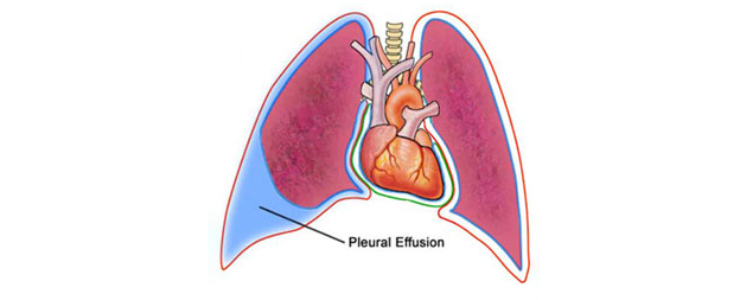Pleural Effusion

The pleural space is bounded by two membranes, the visceral pleura covering the lung and the parietal pleura covering the chest wall and diaphragm. Normally, liquid and protein enter from the systemic circulation and are removed by the parietal pleural lymphatics. Pleural effusion results from abnormal collection of fluid due to excessive production or decreased pleural fluid absorption. It can be transudative or exudative depending on the fluid composition.
In about half of cases of pleural effusion, the diagnosis is apparent after a thorough history and physical examination and a work-up, including diagnostic thoracentesis and by other selected diagnostic tests. In the remaining cases further tests are required including pleural biopsy [Closed or thoracoscopic pleural biopsy].
Common causes of transudative pleural effusion are left ventricular failure, cirrhosis of liver. hypoalbuminemia , atelectasis , renal failure, hypothyroidism, urinothorax, ovarian hyperstimulation syndrome and pulmonary embolism etc. Common causes of exudative pleural effusion are malignancy, pneumonia, tuberculosis, pulmonary embolism, connective tissue diseases, benign asbestos pleural effusion, pancreatitis, oesophageal rupture, chylothorax and drugs etc.
A thorough history may provide clues to the cause of pleural effusion. Cough, breathlessness, weight loss, fever, anorexia are some of the presenting complaints. Symptoms of pleural effusion may vary depending on the cause and the amount of pleural fluid collection. Diagnostic procedures for the cause of pleural effusion should be planned based on the clinical suspicion and the characteristics of the pleural fluid.
At Kovai Chest and Sleep centre, we specialize in providing expert care for patients with pleural effusion and we tailor our approach to your specific condition. Timely and accurate diagnosis is crucial for effective pleural effusion management.